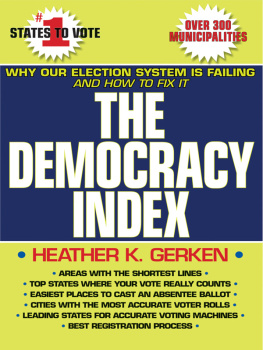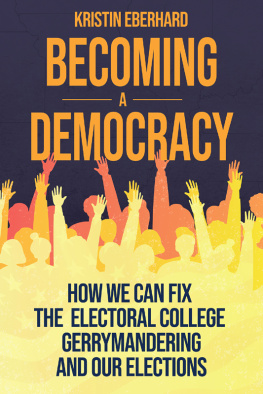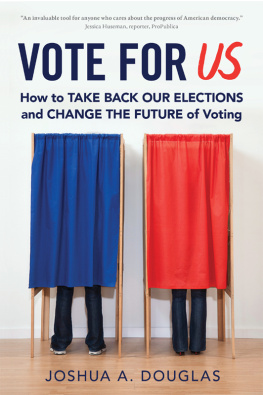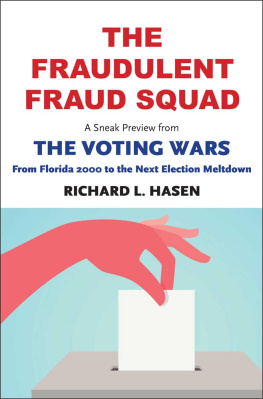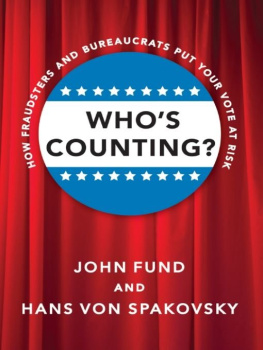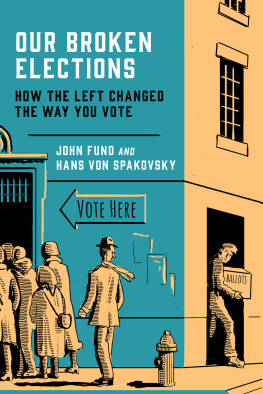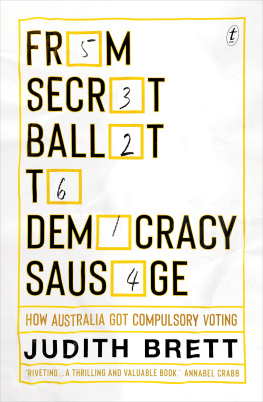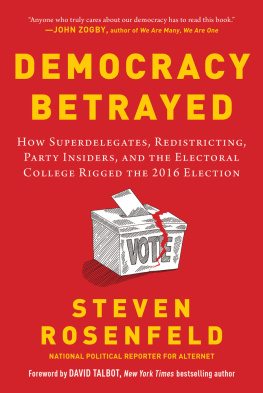
THE DEMOCRACY INDEX

Copyright 2009 by Princeton University Press
Requests for permission to reproduce material from this work should be sent to Permissions, Princeton University Press
Published by Princeton University Press, 41 William Street, Princeton, New Jersey 08540
In the United Kingdom: Princeton University Press, 6 Oxford Street, Woodstock, Oxfordshire OX20 1TW
All Rights Reserved
Library of Congress Cataloging-in-Publication Data
Gerken, Heather K., 1969
The democracy index : why our election system is failing and how to fix it / Heather K. Gerken.
p. cm.
Includes bibliographical references and index.
ISBN 978-0-691-13694-3 (hardcover : alk. paper) 1. VotingUnited States. 2. ElectionsUnited States. 3. Voter registrationUnited States. I. Title.
JK1976.G47 2008
320.60973dc22
2008047802
British Library Cataloging-in-Publication Data is available
This book has been composed in Adobe Garamond pro
Printed on acid-free paper.
press.princeton.edu
Printed in the United States of America
1 3 5 7 9 10 8 6 4 2
For my remarkable parents
Contents

1 The Perverse Politics of Election Reform
Why (We Think) Elections Are Run Badly, and What to Do about It
5 Getting from Here to There in Miniature
Making the Democracy Index a Reality
Conclusion
Getting from Here to There Redux
Acknowledgments

A few years ago, the Tobin Project asked me to pull together a group of scholars to explore the ways in which our work connected to ongoing policy debates. Academics have become increasingly distant from the world of policy, and our goal was to rebuild the ties that once existed between scholars and lawmakers. During our first meeting, I challenged the scholars to present a genuinely modest proposal, a small-scale intervention that would improve the way our democracy works. Thats where I first presented my idea for a Democracy Index. At the time, I thought that the idea would take up a few days and a bit of ink. Instead, it caught hold, and Ive spent a good chunk of the last eighteen months thinking and writing about it. Shortly after I published an editorial on the idea in the Legal Times, Senators Barack Obama and Hillary Clinton each put the idea into proposed legislation. Within the year, Congress set aside $10 million to fund model data-collection programs in five states, and several foundationsincluding the Pew Center on the Statesfunded conferences and initial research on the idea. All of this activity prompted me to write this book, which makes the case for creating the Index and offers my own take on how it should be designed.
I am deeply indebted to Michael Caudell-Feagan, Doug Chapin, Ned Foley, John Fortier, and Paul Gronke, along with their staff at the Pew Center on the States, electionline, the Moritz College of Law at Ohio State, AEI/Brookings, and Reed Colleges Early Voting Information Center. They all worked tirelessly to shape the proposal and move it toward reality, offering advice, financial support, and organizational muscle to push the idea forward. I wouldnt have made it past the editorial stage without them. I owe great thanks to the people who patiently read the entire draft: Bruce Ackerman, Doug Chapin, Ned Foley, Barry Gerken, Thad Hall, Michael Kang, Justin Levitt, Ben Sachs, David Schleicher, Dan Tokaji, three anonymous reviewers, and my editor at Princeton, Chuck Myers, and copy editor Richard Isomaki. Over the course of the last eighteen months, I have also received helpful comments from Ian Ayres, Kim Brace, Richard Brooks, Kareem Crayton, Chris Elmendorf, Dan Esty, Deborah Goldberg, Rick Hasen, Steve Huefner, Christine Jolls, Katerina Linos, Jerry Mashaw, Michael McDonald, Rick Pildes, Charles Stewart, and Jonathan Zittrain; the staff and advisers who helped Senator Barack Obama put the idea into pending legislation; the faculty of Oklahoma City University Law School; and audience members at the Section on Legislation session at the 2007 meeting of the Association of American Law Schools. Ive benefited greatly from the thoughts and criticisms offered by the participants in the Designing a Democracy Index conference sponsored by the Pew Center on the States, the Joyce Foundation, and the Mortiz College of Law; the participants in the 2007 Academics Conference sponsored by the AEI-Brookings Election Reform Project; and the participants in the Data for Democracy Conference sponsored by the Pew Charitable Trusts and the JEHT Foundation. I am especially grateful for the many reformers, academics and election officials (including three secretaries of state) who took time from their busy schedules to talk to me about the work they do. You will see their names scattered throughout the book. Thanks also to David Pervin for suggesting I write this book and to the Tobin Project for pushing me to think about this project in the first place. I am grateful for the financial support provided by the Oscar M. Ruebhausen Fund and the Yale Law School and the assistance provided by Theresa Cullen and the staff of the Yale Law Library. Scott Grinsell, Sarah Burg, Jill Habig, Dina Mishra, John Nann, Ari Weisbard, Saumya Manohar, William Rinner, and Marin Levy provided excellent research support. I must give special thanks to Manav Bhatnagar, who did the bulk of the research and responded to all requests with exceptional speed and good cheer, and to Scott Grinsell, who patently read through an early draft. Peter Miller provided invaluable help in putting together the ranking of state disclosures, and Daniel Bowen was very helpful in assessing initial measurement processes. Finally, thanks to my husband, David Simon, who makes all things possible and who would blush if I wrote what he means to me.
Introduction:
Why We Need a Democracy Index
Our election system is run badly. Although many people are aware of the problem and eager for a solution, reform efforts have gotten surprisingly little traction. This book explains why election reform has yet to catch hold and offers a promising new solution for getting change passed: a Democracy Index, which would rank states and localities based on how their election systems perform.
THE PROBLEM
The best evidence we have suggests that our election system is clunky at best and dysfunctional at worst. Ballots are discarded. Poll workers are poorly trained. Registration lists work badly. Lines can be too long. Machines malfunction. Partisan officials change the rules of the game to help themselves and hurt their enemies. Election administrators cannot agree on what constitutes a best practice, or even whether there is any such thing. Authority is decentralized, so its hard to know whos to blame when a problem occurs. Most experts agree that the system we use to run our elections is chronically underfunded, often poorly run, and sometimes administered in a partisan fashion.
People assume that the fiascos we saw in Florida in 2000 and Ohio in 2004 are outliers, crises caused by a level of partisanship and mismanagement that does not exist elsewhere. Partisanship and mismanagement surely played a role in those debacles. But both states were also in the wrong place at the wrong time, victims of a turnout tsunami that too few states are equipped to handle. A crisis is not around every bend in the United States. But thats only because elections usually arent close enough for these routine problems to affect the outcome. Unless we fix the underlying causes, debacles can occur almost anywhere.
Next page
